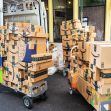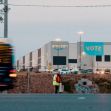A new lawsuit by New York Attorney General Letitia James alleges e-commerce giant Amazon had "flagrant disregard for health and safety requirements" for workers during the COVID-19 pandemic. The lawsuit claims Amazon workers were put in grave danger in New York from the highly transmissible virus, as demand for shipped goods grew exponentially.
James said Amazon grew exponentially during the pandemic while hurting workers.
Amazon “netted over $130 billion in profits from online sales—representing 35% growth from its pre-pandemic earnings and a 10% higher growth rate than in prior years—at the expense of its frontline workers who have experienced significant risks of COVID-19 infection while working at Amazon," the court papers state.
James claims Amazon disregarded COVID-19 health mandates for workers since March 2020.
“Throughout the historic pandemic, Amazon has repeatedly and persistently failed to comply with its obligation to institute reasonable and adequate measures to protect its workers from the spread of the virus in its New York City facilities JFK8, a Staten Island fulfillment center, and DBK1, a Queens distribution center,” noted the lawsuit. “Amazon’s flagrant disregard for health and safety requirements has threatened serious illness and grave harm to the thousands of workers in these facilities and poses a continued substantial and specific danger to the public health.”
The long list of alleged Amazon health infractions includes not cleaning or disinfecting after COVID-19-stricken workers were present in facilities; failing to identify ill workers and those workers around the infected persons; not enforcing discipline and productivity policies; usage of automated productivity rates in line-speeds; inadequate sanitation; lack of proper social distancing; not allowing employees time to use proper hygiene during the pandemic; and overall insufficient cleaning practices on site.
Court papers state Amazon employees complained to management and experienced “swift retaliatory action.” As early as spring 2020, Amazon fired workers due to their complaints about COVID-19 health and workplace safety issues.
“In late-March 2020, Amazon fired employee Christian Smalls, and in early-April 2020, Amazon issued a final written warning to employee Derrick Palmer,” court papers revealed. “Amazon’s actions against these visible critics who advocated for Amazon to fully comply with legal health requirements sent a chilling message to other Amazon employees.”
The lawsuit also alleges Amazon is currently not adhering to current pandemic health and safety mandates in its facilities. The case notes eighty instances where Amazon “failed and continues to fail to close all or a portion of its facilities for the requisite ventilation, cleaning and disinfection when an infected worker has been present in the facility within seven days. By Amazon’s own account, it has failed to undertake these measures on at least eighty occasions in the JFK8 facility alone.”
Another breach of pandemic protocol by Amazon, according to court documents, is the company’s lack of identifying and contacting infected workers and their fellow workers. This particular action, as per the lawsuit, placed workers in “grave” danger.
During the height of New York’s deadly battle with COVID-19 in 2020, there were about 28,888 deaths.
Lastly, James accuses Amazon of pushing workers to meet ambitious goals without considering the time needed for hygiene during the Pandemic, social distancing, and more.
“Amazon has continued tracking and disciplining employees based on their productivity rates and their time not engaged in filling customer orders (“time off task”), which has significantly limited employees’ ability to take steps that are necessary to maintain social distancing, clean their workstations, and engage in sanitary and hygienic practices necessary to fully protect themselves and co-workers from the spread of the virus,” said James.
The New York lawsuit came on the heels of a preemptive lawsuit Amazon filed a few weeks ago in federal court in Brooklyn, where court papers claim federal labor and workplace safety laws control, rather than New York state laws. If this lawsuit is successful, it will invalidate New York’s lawsuit since the empire state would no longer have the legal authority to sue the multi-billion dollar shipping company.
Meanwhile, about six-thousand Amazon warehouse workers in Bessemer, Alabama, will soon be voting on whether or not to unionize. The unionization efforts grew from issues such as pandemic workplace safety. If workers vote for unionization there, it would be the first Amazon unionized warehouse in the country.






